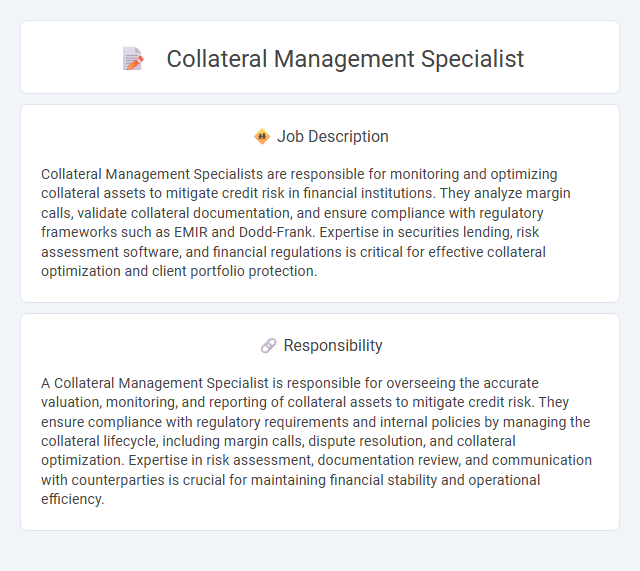
Collateral Management Specialists are responsible for monitoring and optimizing collateral assets to mitigate credit risk in financial institutions. They analyze margin calls, validate collateral documentation, and ensure compliance with regulatory frameworks such as EMIR and Dodd-Frank. Expertise in securities lending, risk assessment software, and financial regulations is critical for effective collateral optimization and client portfolio protection.
Individuals with strong analytical skills and attention to detail are likely to thrive as Collateral Management Specialists, given the job's demand for precise risk assessment and asset monitoring. Those who are comfortable working with complex financial data and maintaining regulatory compliance may find this role suitable. People who prefer structured environments and can manage pressure effectively have a higher probability of succeeding in this position.
Qualification
A Collateral Management Specialist typically requires a bachelor's degree in finance, economics, or business administration, alongside strong analytical and organizational skills. Proficiency in collateral management systems, regulatory compliance knowledge, and experience with risk assessment are crucial qualifications. Certifications such as CFA, FRM, or CAMS enhance expertise and career prospects in this role.
Responsibility
A Collateral Management Specialist is responsible for overseeing the accurate valuation, monitoring, and reporting of collateral assets to mitigate credit risk. They ensure compliance with regulatory requirements and internal policies by managing the collateral lifecycle, including margin calls, dispute resolution, and collateral optimization. Expertise in risk assessment, documentation review, and communication with counterparties is crucial for maintaining financial stability and operational efficiency.
Benefit
A Collateral Management Specialist likely enhances financial stability by efficiently monitoring and optimizing collateral assets, reducing counterparty risk for organizations. The role probably improves liquidity management, ensuring that collateral is allocated properly to meet regulatory and contractual obligations. This specialization tends to contribute significantly to operational efficiency and risk mitigation in financial institutions.
Challenge
Managing collateral in financial markets presents a complex challenge due to evolving regulatory requirements and the need for real-time risk assessment. The role likely demands strong analytical skills to navigate intricate asset valuations and optimize collateral allocation efficiently. It probably requires constant adaptation to technological advancements and market fluctuations to mitigate potential risks effectively.
Career Advancement
A Collateral Management Specialist plays a critical role in overseeing asset pledges and mitigating credit risk within financial institutions, offering a strong foundation for career advancement into senior risk management or treasury roles. Mastery of regulatory compliance, collateral valuation, and negotiation skills significantly enhances opportunities for leadership positions and specialized certifications such as FRM or CFA. Continuous development in technology integration and market trends positions professionals to advance into strategic roles like collateral operations manager or chief risk officer.
 kuljobs.com
kuljobs.com